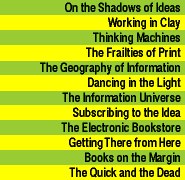


The Quick and the Dead
[I]t at once struck me that under these circumstances favourable variations would tend to be preserved and unfavourable ones to be destroyed.... Here, then, I had at last got a theory by which to work.
Charles Darwin,
The Autobiography of Charles Darwin
Publishers could then tailor their books to specific groups of subscribers, based on information that subscribers volunteer about their tastes and interests. Eventually publishers could even tailor books to individual subscribers, thus becoming immune to the raids of pirates producing uniform copies of one version of each book. Nobody would buy off-the-shelf clothes if tailor-made ones were just as cheap and available.
Yet, while interesting, a future full of electronic books won't be a simple world. Eventually the communication, computation, and entertainment heavyweights will weigh in and crush most of the small fry. Even that, of course, might be good in the long run, since to do so they'll have to use economies of scale to bring the price of display technology low enough for the general public to afford it; and they'll have to promote it heavily to develop a big enough market for them to swim in. Once that first tidal wave passes, however, small independents will start up again to service various niche markets.
To put all that change in perspective, it might be helpful to look at Western Europe in the middle years of the fifteenth century, just before and during the early days of printing. The most virulent outbreaks of the Black Death had just passed, and the economy was beginning to recover. Chaucer had been dead for fifty years, Columbus was an infant, and Shakespeare wouldn't be born for another hundred years. England, Scotland, Ireland, and Wales were still independent countries. France, just recovering from yet another long and pointless war with England, was a set of feudal duchies and principalities. Germany didn't exist yet; it was still a set of warring princes rattling around in a power vacuum. Italy was fragmented politically. One of its independent city-states---Venice---thanks to its stranglehold on Asian trade, was the single richest European power. Spain was simply four kingdoms---three Christian, one Islamic. Constantinople had just fallen to the Turks, and all Europe seemed sure to soon follow. Most medieval Europeans viewed the future with despair, thinking that their best days were behind them.
This was the setting into which printing emerged in the 1450s and everything immediately started to change. Living in a dark time, Europeans used the new books to spread the fire of knowledge everywhere, and that fire nursed along a Renaissance, a rebirth. Everywhere, new attitudes and new inquiries took shape and blossomed. Everywhere, ancient authority and ancient custom were questioned.
The changes were not solely the result of printing of course. But print played a large part by improving the speed of creation and the dissemination of knowledge, which always lead to big changes in how we live and what we think.
Still, every change has a potential negative side; that's why so many of us fear it. The bacteria that caused the Black Death, for example, had been living in rodents in central Asia for who knows how long. They were introduced into Europe only when Europeans started to form permanent long-distance trade links with Asia. Now they're all over the world. No matter where you live, if you camp out or live with a pet near a wooded area anywhere on earth, you too could catch it.
Change is frightening, because it can have unknown side effects. But it's also inevitable. Established publishers should brace themselves for heavy weather ahead. The world they're used to, the world they've grown comfortable in for the past five hundred years, is about to change again. Once again life-forms are about to be divided into the quick and the dead. The dinosaur killer has already descended through the atmosphere. And now it's about to hit.